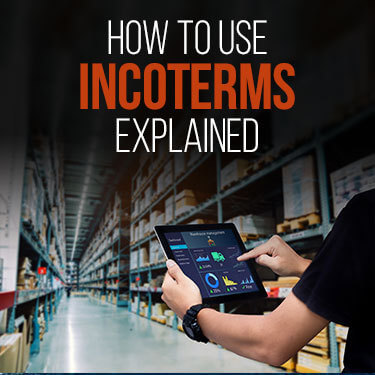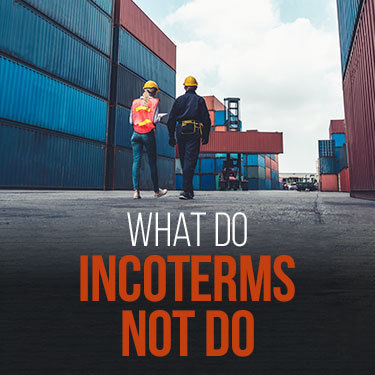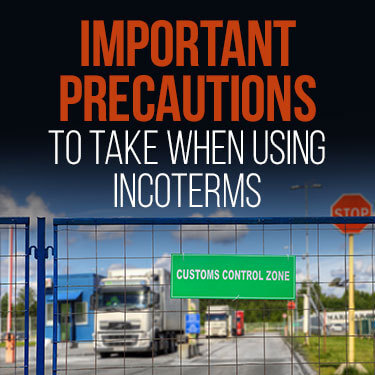Knowing how to use Incoterms is very important if you want to conduct a successful international transaction. Even the simplest mistake can result in a significant misunderstanding of responsibilities. Fortunately, using Incoterms correctly is easy and can help prevent those issues..
According to the International Chamber of Commerce (ICC), these steps show how to use Incoterms for international transactions.
Once you know how to use Incoterms, we’ll cover some precautions you should take and discuss what Incoterms cannot be used for so you can avoid confusion.

As we discussed above, there are three steps that you will have to carefully follow to indicate Incoterms and use them correctly. Though there aren’t many steps, completing each one does require focus and care.
Before Incoterms can be indicated and used, both buyer and seller have to agree to a specific Incoterms. Without the agreement of both parties, the Incoterms can’t be recognized.
Some Incoterms are beneficial to buyers while others are beneficial to sellers. There are even Incoterms that divide the responsibilities evenly. Regardless of which one is chosen, buyers and sellers must negotiate with one another and decide on the same trade terms that work best for their given situation.
When negotiating with a seller on what Incoterms you both should agree on, ask yourself these questions:
Taking these questions into consideration will help guide you to finding Incoterms that suit your needs.
After you and the seller have agreed on an Incoterm, the next thing that you will have to do is state what Incoterm is being used on each shipping document. Documents you’ll need include:
Verbally agreeing to Incoterms isn’t enough because the agreement would be hearsay. Having the Incoterms listed in all relevant shipping documents will create a record showing that an agreement was made.
Along with naming the chosen Incoterms on all shipping documents, you need to include the specific port that you want your goods delivered to. This is especially important to do if the Incoterms give the seller the responsibility of finding a carrier to ship the goods you’ve bought to your country.
Without a fully specified destination to deliver your goods to, the seller can essentially deliver the goods anywhere in the general area of where you want your goods. This is a mistake we recommend importers avoid in our Incoterms mistakes article. You should also include the version of Incoterms you’re using, such as incoterms 2010 or incoterms 2020.
When specifying where your goods should be delivered, use our template below.
(Incoterm), (Address), Based on (Incoterm Version Placed Here)
If you require assistance with filling out any information on these important customs documents, then schedule a consulting session with our licensed customs brokers so they can help you out.
Want to learn more about Incoterms? Find out what other advantages they provide.

Many importers have misconceptions about what Incoterms do. Before you start using them, it’s important to understand what they don’t cover so that you can avoid making any mistakes during the shipping process.
One fairly common misconception about Incoterms is the belief that they indicate the transfer of title or ownership of goods from the seller to the buyer. In reality, Incoterms do not indicate when this happens at all.
They do, however, determine at which point there is a transfer of risk from the seller to the buyer. This misconception happens because buyers and sellers assume that with risk comes title and ownership.
While Incoterms dictate whether a buyer or seller will take responsibility for the customs formalities of a shipment, they do not detail what those formalities are. It would be difficult for the ICC to keep track of all customs regulations in every country and then include them all in their Incoterms. Whether you’re a buyer or a seller, you need to familiarize yourself with whichever customs regulations you’re responsible for.
Sometimes, buyers and sellers mistakenly think that Incoterms determine the form of payment and when payment is due. Incoterms do not go in-depth into these payment details.
Incoterms only tell who pays, what they pay for and when they should pay it. Details like how they pay and how quickly the funds need to be cleared are up to the buyer and seller to decide separate from Incoterms.
Incoterms will never state what goods are being shipped or their price. That is the purpose of commercial and proforma invoices. Instead, Incoterms simply discuss the responsibilities regarding goods. If you want information or need to provide some type of information about your shipment, you’ll have to consult other documents with those details.
The table below summarizes what we’ve discussed by showing what Incoterms do and don’t do.
| Do | Don’t Do |
| Do determine when risk is transfered | Don’t determine when title or ownership is transferred |
| Do specify what party is responsible for handling customs responsibilities | Don’t specify what thos customs regulations are |
| Dictates who is responsible for paying for what and when they should | Don’t specify how that payment is paid and how fast |
| Do discuss risks and responsibilities of goods | Don’t discuss what those goods are or their price |
If you have any questions about Incoterms, our licensed customs brokers will be able to help you in a consulting session.

Our 45 Minute Licensed Expert Consulting Will Personally Guide You.

When the Incoterms have been agreed on and recorded in all relevant paperwork, there are a few precautions that you should be aware of going forward with your international transaction. Even though Incoterms help the buyer and seller understand one another, abiding by the responsibilities they dictate can be tricky.
Knowing what Incoterms are and how they work is extremely important before you can use them. Although they’re not required, each one is important and provides unique ways for two parties to conduct business. That said, not knowing the details of each Incoterms rule can cause you to agree to one that favors the buyer more than it favors you.
Brush up on the 11 types of Incoterms here in one of our articles. There you will learn about each type, their categories and what type of transport each can be used for.
Multiple Incoterms require the buyer to handle the customs responsibilities of their country. Depending on what your goods are, you might have to complete a long list of customs formalities for your goods to be cleared.
Some of the responsibilities that they include:
Staying on top of all of these regulations can be a real challenge for any importer, especially one who lacks experience. Fortunately, hiring a customs broker can help you solve this problem. They’re specialists at all things import or export and their sole duty is to assist you. Even better, at USA Customs Clearance, we have a team of brokers who can provide their services to you.
Incoterms are essentially abbreviations that briefly explain what the buyer and seller are responsible for. Nonetheless, it’s an excellent idea to write out how you will carry out the responsibilities dictated to you by the chosen Incoterm. This will prevent mistakes and further clarify the arrangement even better than before. You should encourage the seller to do the same.
Incoterms don’t disclose every single aspect of an international shipment or transaction. Therefore, you should still include detailed information about your shipment on shipping documents. Also, be sure to read through the shipping documents provided to you by the seller. These documents will be sure to have detailed information about your shipment that will be helpful to you.
If you’re still unsure about how to use Incoterms, then consider scheduling a consulting session with one of our licensed customs brokers. They will be able to walk you through everything you need to do to properly implement Incoterms into your international transaction.
For importers that are already clear on Incoterms and ready to bring goods into the country, we can provide you with a continuous customs bond. With this bond, you’ll be able to import numerous goods into the U.S. for the entirety of a year.
Take advantage of our other services as well:
Whatever it is and from wherever it’s coming from, USA Customs Clearance can help you with your imports. Call us today at (855) 912-0406 or use our online contact form to send a direct inquiry.

Our 45 Minute Licensed Expert Consulting Will Personally Guide You.
 Copy URL to Clipboard
Copy URL to Clipboard
Add your first comment to this post